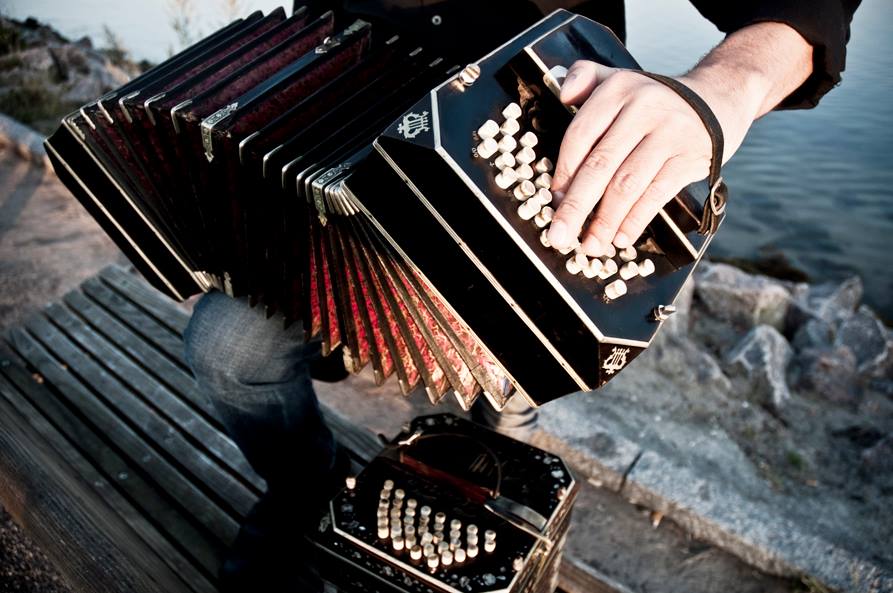A Conversation with Paolo Russo
I had the pleasure of talking with Paolo Russo over the phone for a rather long time in the lead up to his upcoming album release “Imaginary Soundtrack”.
I have composed our conversation and interview into the form of a monologue only minutely edited the text in order to make sense to the readers.
Paolo is a classical musician, trained for many years, and featured in many ensembles. His art is in playing and composing for the bandoneon of which is he is the well established master. He was born in Italy, and moved and resides in Copenhagen where he has worked full time in music since, recording fifteen albums to date.
Our conversation was enlightening into the deep philosophy that Paolo holds music accountable for.
In the words of Paolo Russo:
“Sometimes I feel that music can make your mind over stimulated and that perhaps sometimes a more intimate experience is necessary with music. One must not be a slave to their texts in terms of musicality.
A British philosopher once said not to live life in a non-authentic manner. This is how I choose to live my life. This is how I would choose to define my musical vision - authenticity - being my true self, being who I am.
I believe that in our lives, it is the two: art and music that in general are absorbing the suffering of the human condition of the world, - music itself is a function that I would define as: art therapy.
Every time I play, I am going to therapy - I play so I don’t get sick.
I have a routine: and to practise Bach in the morning, this will clear your mind, like running or going to the gym. Practising two hours of Bach in the morning, you are cleaning your soul and your organs, you are ready to embrace the day with a clearer mind and spirit.
Now I started to play the bandoneon, which is a small square concertina, far later in my life. I first learned to play the piano from the age of nine or ten. My parents were not musical at all, but I used to witness concerts in the churches. Whilst I was taking exams in classical music in the conservatory, I was further intensely studying architecture for five years.
So I was finally 23 years old when I graduated from my final exams in the conservatory of classical piano, all of which I had prepared for privately.
I had decided that I must make a living by fulfilling my dream, and this dream didn’t lead me to the capital city of Italy, a city that is dense - despite it’s wonderful beauty.
Since a young age it was Kopenhagen that felt as though it would be my up-grade. I felt a strong call to the city, both rational and irrational.
The irrational comes from being in my bedroom in Italy which faced North. The shades in my window were broken and consequently they remained open. There were a few buildings in my view, and behind them there were rolls of small hills.
Here I used to peer and gaze and I would enter my imagination: a woman from the 18 hundreds, with deep ancient roots, had young small children with blond hair - and together they would run and roam on the hills. I felt an affiliation that these young blonde children and their mother were from Copenhagen.
I saved all my money from working and in December of 1993, I went to Copenhagen, and it was cold, and it was dark and I loved it. I had to return to Italy once to complete my civil service, however upon return to Copenhagen, I began work with a saxophone player and after only a few short months, the saxophonists sister was introduced to me, and became my wife. This was twenty-three years ago.
When I moved to play my music, there were four conservatories to choose from in Denmark as apposed to the 56 in Italy - so in Copenhagen I studied at the ‘Rhythmic Music Conservatory’ in which I embraced all forms of music that were not simply classical and opera. The conservatory was a big relief for me to study in, with grande windows over looking lakes, and a large modern building for the school. I learned a lot of music from the others surrounding me in the conservatory. I embraced the education and even wrote a letter addressed to all my comrades in the school entitled “Observations of a Fourth Year” detailing how I felt the school should be treated by my peers.
I have learned and lived that you must invest energy in order to be a better musician. You must practise. I have put my energy into fifteen albums of music.
The human soul does not have geographical borders, the power of music can corrupt anyone.”



